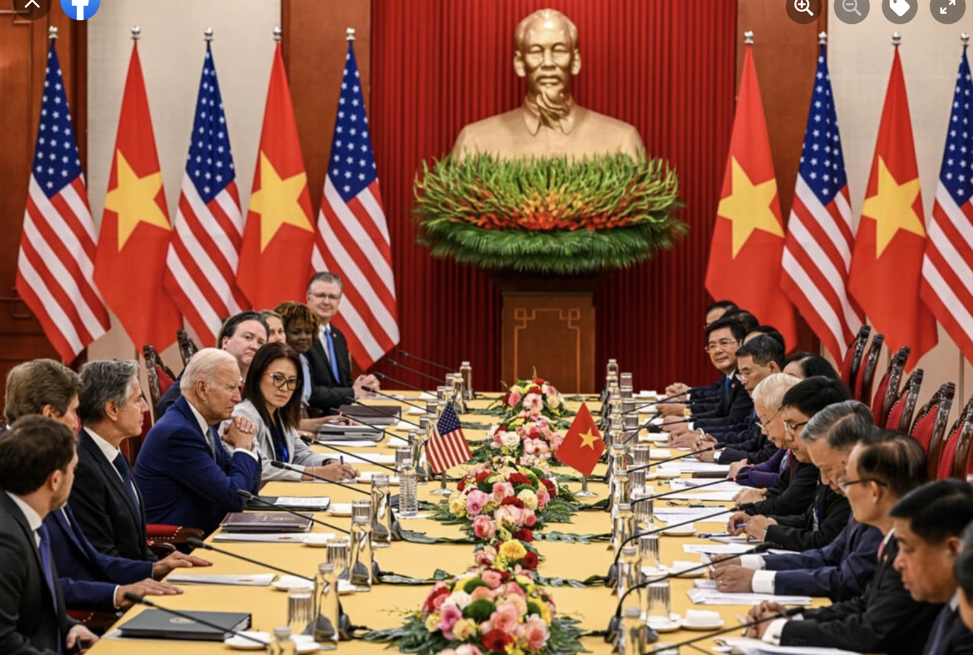The last three times I have traveled it was to Vietnam. I prepared in all the usual ways—passport, suitcase organization, contingency plans—and I used Rosetta Stone and/or Duolingo to study the language. I had no illusions that I would be able to speak Vietnamese, I just wanted to have a clue, a bit of something to hold onto. I wanted a spark of recognition when I was there and that did happen. Once when I was looking at signs on shops in Hanoi I recognized the word “shoes.” It sounds silly, but in that moment I knew I was getting what I had come for, which was the sense that “Hanoi” was not the enemy, but a place where people lived, and worked, and raised families, … and bought shoes.
So I don’t know what to make of the photos of the American entourage in state meetings with Vietnamese leadership. I used this one as a prompt for one of my writing groups and though we had nuanced reactions, we did not know what to make of it either, for there was no way to tell from the photo anything other than the fact that it was happening.

This morning I read that even President Biden, whose values and courage I not only admire but cling to as a sign of hope in desperate times, could only manage a both-sides accountability: “I’m incredibly proud of how our nations and our people have built trust and understanding over the decades and worked to repair the painful legacy the war left on both our nations.” (Joe Biden and Vietnam: American presidents can’t tell the truth about a tragic mistake, Norman Solomon in Salon, 2 September 2023)
In other words, no accountability at all.
Even now, after all this time, even the best of American leaders cannot swallow the smallest amount of pride in order at least to acknowledge our grievous culpability. (Is that why veteran John Kerry, who had testified before Congress while the war was still raging about the things he had seen, seems almost to be pushing himself away from the table? Is he thinking—as I am—”it’s still happening, the linguistic framing that means the lessons are not learned?)
I am traveling again, after a hiatus of six years. This time I go to Wales where tourists are invited to visit any number of castles. There are lots of castles in Wales, possibly 600 just from the Norman period in a country roughly the size of the state of New Jersey. The grandest and most famous were built by Edward I to keep the Welsh subdued after he defeated Llywelyn ap Gruffudd in 1282. Subduing the Welsh was not an easy task as they were quite accustomed to wars both with outsiders and with each other, so the castles were installed as reminders.
Vietnam was quite accustomed to war, also, before we arrived. Like Wales, Vietnam is a small country menaced for centuries by the much larger neighbor on its border. The United States is large enough that it does not provide an easy target for predators, which also means it is in a position to be the predator at will and justify it as necessary or even magnanimous: we were only protecting South Vietnam and also we meant well.
We now regard castles as romantic remnants of the bygone Middle Ages, whose art and architecture is also my home. Edward’s castles are lit up at night, appear in glossy photos, fly the Welsh flag. But what is not drawing attention to itself holds another story. It is all in the details, the language (I am using Duolingo again), the land, the ancient place names. I will only get a hint, but I look forward to seeing a word I recognize.